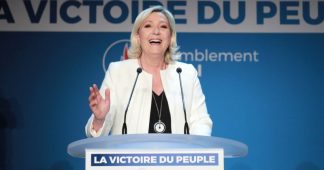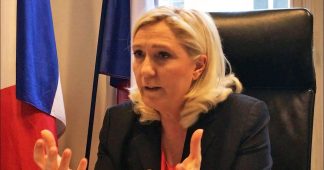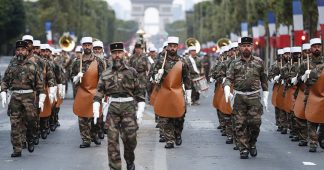No one on the French left wants the 2022 presidential election to be another contest between Macron and Le Pen, yet its own forces remain deeply divided. A left-wing alliance for the Hauts-de-France regional election is making parties like the Greens and France Insoumise put aside their differences — but also highlights the difficulties of forming any common strategy for national politics.
By Cole Stangler
Apr.13, 2021
During the last regional elections, in 2015, the Greens, Communists, and Socialists each ran separate tickets in the northern region, since renamed Hauts-de-France. This area was once a bastion for organized labor and the Left but has struggled heavily with deindustrialization and has seen growing support for the far right in recent years.
Only the PS qualified for the second round six years ago, finishing well behind Xavier Bertrand of Les Républicains and the far right’s Marine Le Pen who led the first-round tally on a staggering 40 percent. To avoid the risk of a Le Pen victory, the PS chose to drop out of the race — a humiliating sacrifice in a part of the country it once dominated. The move achieved its short-term goal, but it deprived the PS of any representation in the Regional Council, leaving it in the hands of a LR majority and a RN opposition.
“Very simply, we don’t want 2015 to repeat itself,” explains Karima Delli. “For six years, we’ve had a right wing that’s been inefficient, the social damage has been terrible — look at the number of companies and factories that have shut down — and above all, there’s a horrible delay in the environmental transition.”
In addition to consolidating left-leaning electors under one big tent, Delli aims to draw in other voters through a clear message linking labor issues to the environmental crisis. “What unites us is our program, the question of the climate and the question of jobs,” she continues. “What’s good for employment can be good for our food and good for our lungs.”
The daughter of Algerian immigrants, the forty-two-year-old currently chairs the EU Parliament’s Committee on Transport and Tourism — experience Delli believes makes her well-equipped for the difficult task of running a coalition government. “My job in the European Parliament helps me a lot because, every day, I’m working to build majorities with the opposition and with antagonistic forces, finding deals,” she says. “I remain inflexible on values, but I respect my partners each time.”
Behind the Wheeling-and-Dealing
Like least year’s municipal elections, France’s regional and departmental elections famously encourage alliance-building: Unity ahead of the first round can propel tickets to the front of the race, while deals before the second round can make or break majorities.
That parties on the Left are making pacts is not surprising in itself. But the agreement in the Hauts-de-France is notable because of its broad scope and because of the tensions that exist on the national level, particularly between the PS and LFI whose leaders Jean-Luc Mélenchon and Olivier Faure have publicly sniped at each other for the better part of Emmanuel Macron’s presidency.
“Politics isn’t just about wishes and hopes, you have to deal with what’s in front of you,” says Ugo Bernalicis, a thirty-one-year-old member of the National Assembly leading La France Insoumise in the Hauts-de-France.
Bernalicis tells Jacobin his party’s original plan did not involve making a pact with the PS. He says LFI was aiming for an agreement with the Communists and Greens — both of whom were open to that possibility but also wanted a deal with the Socialists. Ultimately, that meant the only scenario under which LFI could achieve its goal was a four-party agreement. “It doesn’t mean at all that there aren’t contradictions between the left political forces,” Bernalicis stresses. “To the contrary, there are many and they’ll be present for the presidential election coming up soon.”
But the awkwardness hasn’t disappeared overnight. “We’re still in the first days after this deal,” Bernalicis tells Jacobin. “At the moment we need to find our collective identities to be able to campaign comfortably. Because it’s not easy, that’s not yet the case. We’re going to have to ramp things up in the coming weeks.”
As Bernalicis explains, major disagreements persist on national political issues — for instance, on nuclear power (the PCF’s Roussel favors it, while LFI and EELV want a rapid transition away from it), and how to approach the European Union (the PCF and LFI tend to be more critical of Brussels; the EELV and PS less so).
But the coalition plans to focus on what they have in common and on policies they have the power to enact in regional government. According to Bernalicis, that includes things like supplying high schools with organic, locally sourced food; defending public services; pushing back against efforts to privatize the rail system; and putting measures into place to claw back public money from companies that lay off or outsource work. “It’s a minimum agreement to govern the Regional Council, and it’s a minimum that’s already at a pretty high level,” the MP says.
The Million-Euro Question
It remains unclear whether similar first-round alliances will spring up in metropolitan France’s twelve other regions. Most observers agree that one of the most important preconditions for left unity is weakness — areas in which the various parties are in the opposition and cannot realistically compete without joining forces.
By that measure, regions on the radar include Auvergne-Rhône-Alpes (which includes Lyon), Provence-Alpes-Côte d’Azur (which includes Marseille, home to a newly elected, united left municipal government), and Grand Est (which includes Strasbourg) — all of which are currently governed by the right-wing Les Républicains and feature relatively high levels of support for the far right. Negotiations are still ongoing over coalitions in each of those cases.
In other parts of France, left alliances aren’t expected until the second round, like in Île-de-France, the region that includes Paris but that is currently governed by a LR-led majority. In other regions, still, like Brittany or Nouvelle Aquitaine, Socialist-led coalitions aim to defend their majorities — proving their resilience on the local level despite the party’s implosion in the 2017 electoral cycle.
The million-euro question, of course, is whether the pact in the Hauts-de-France will lay a foundation for the 2022 presidential elections. Will it go down in history as a mere footnote of the latest regional election cycle or as a launching pad to something more significant? At the moment, its authors insist they’re just focused on the region.
“We didn’t do this to set an example,” Delli tells Jacobin. “We did this because the situation required making a deal. We didn’t do this to be a model. We just want one thing — to transform people’s lives for the better … I’ll let others judge if the Hauts-de-France can be a political laboratory for the rest of France. It’s not for me to say.”
Still, it’s impossible to ignore the national implications of the race — across the political spectrum. After a string of near-misses in 2015, Le Pen’s Rassemblement National hopes northern voters will deliver them their first-ever breakthrough on the regional level, just ahead of a presidential race that polls now show she has a solid chance of winning.
The region’s current president, Xavier Bertrand of LR, has already announced his presidential bid but has vowed to drop out of the race and retire from political life if he doesn’t win reelection in the Hauts-de-France. If the Left were to sneak out a victory against the odds, it would unquestionably weigh on the various parties as the 2022 campaign heats up and the pressure increases to make deals.
For those close to La France Insoumise, a key question is whether the accord in the North will dull the party’s anti-establishment appeal. Many within LFI credit Mélenchon’s relative success in the 2017 presidential race with his ability to win over voters disillusioned with the political system as a whole — the product of a populist message targeting low-income electors who might have otherwise stayed away from the polls, rather than appeals to “unite the left.” Will LFI’s credentials be hurt by its association with parties that have been around for more than a century or will the movement get a shot in the arm ahead of the presidential race?
“I’m not a fervent believer in unity before all else,” Bernalicis says. “I think first of all one needs to convince people on the basis of politics, and if it’s just to defend milquetoast policies, then it’s not worth it. So, we’ll see the result and if a dynamic takes hold.”
Bernalicis says he thinks his coalition can win, but genuinely isn’t sure what’ll happen. “It’ll depend on how the electorate and our electors perceive this union,” he says. “Oftentimes people think that if one candidate gets 5 percent and the other 6 percent, that if they get together, that means 11 percent. No, sometimes it’s 8 percent, sometimes it’s 15 percent. Sometimes it subtracts, sometimes it can multiply.”
“We get messages saying ‘Ah this is scandalous, this is an electoral calculation.’ And I get just as many saying, ‘Bravo! finally you’re together,’” Bernalicis continues. “Even if I’m an actor in all this, I’m curious to see the result and to be able to analyze it at the end.”
Published at www.jacobinmag.com











